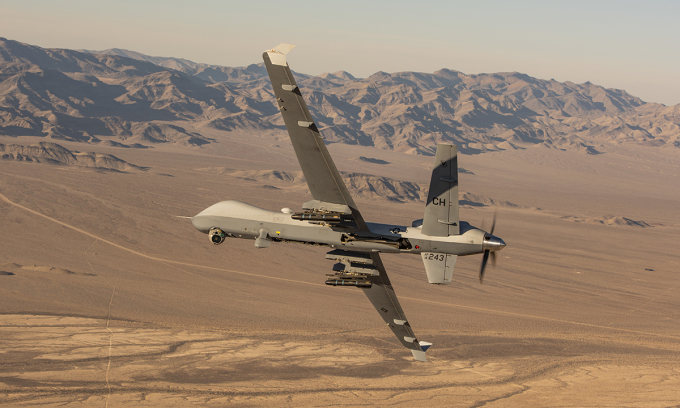
The U.S. military could support Mexico’s fight against drug cartels by training its armed forces, deploying drones and long-range weapons, or even conducting targeted airstrikes, according to security analysts.
Since taking office, President Donald Trump has signed an executive order designating drug cartels as foreign terrorist organizations. He has also floated the possibility of sending U.S. troops into Mexico to combat organized crime.
However, former U.S. defense, intelligence, and government officials warn that such a move would face major legal, political, and diplomatic obstacles, as well as serious geopolitical risks.
Targeted Airstrikes and Drone Attacks: A Likely First Step
So far, the U.S. military has never directly attacked drug cartels inside Mexico, and any cross-border deployment of American troops would be unprecedented. However, U.S. officials have reportedly discussed military responses after Mexican cartels allegedly used drones to attack U.S. law enforcement personnel along the border.
According to Howard Altman, an editor at U.S. defense publication War Zone, the most likely course of action would be precision airstrikes using drones and long-range weapons.
"Targeted strikes, especially with UAV support, could effectively eliminate high-value cartel members," Altman said.
A ground assault, on the other hand, would be much riskier. Mexican cartels are heavily armed and highly organized, with some using advanced combat tactics, including drone attacks. Many cartel bosses operate from heavily fortified compounds, protected by multiple layers of security, making raids difficult.
"U.S. ground forces could face serious resistance," Altman noted. "There’s also the risk of U.S. soldiers being captured or left behind in combat situations."
While airstrikes would reduce these risks, they also come with downsides. Without troops on the ground, the U.S. would struggle to gather actionable intelligence, making it harder to replicate past successes in Afghanistan and Iraq.
Additionally, Mexico’s airspace remains sovereign territory. The U.S. would need Mexico’s approval to operate drones legally. If Mexico refused, its air defenses—though limited—could attempt to shoot down unauthorized U.S. drones.
"Any direct U.S. military action inside Mexico, whether through airstrikes or ground raids, would be a major escalation," Altman warned. "It could trigger widespread hostility and retaliatory violence, including cartel attacks inside U.S. territory."
A Safer Alternative: Training Mexican Forces
Instead of launching unilateral strikes, the U.S. military could expand its role in training Mexican forces. This approach has precedent—the U.S. has provided counter-narcotics training to Mexico and other Latin American nations for decades.
U.S. Army Special Forces (Green Berets), experts in counterinsurgency and asymmetric warfare, have previously conducted Foreign Internal Defense (FID) missions, where they train host-nation forces to combat security threats.
"Many Green Berets speak Spanish fluently and understand Latin American culture and tactics," said a former Green Beret who assisted Colombian security forces in the past. "They would be the best fit for training Mexican forces."
U.S. assistance could include:
- Training Mexican police and military units in counter-cartel operations
- Helping establish rapid-response task forces to combat cartel violence
- Providing intelligence-sharing and surveillance support
This low-profile approach would allow the U.S. to assist Mexico without causing international backlash or escalating tensions at the border.
Shifting U.S.-Mexico Relations and Potential Challenges
President Trump’s military intervention plans may now be less urgent after his administration reached a new security agreement with Mexico.
Under the deal, the U.S. postponed a planned 25% tariff on Mexican goods, while Mexico agreed to deploy 10,000 National Guard troops to its northern border to stop drug smuggling, particularly fentanyl.
After speaking with Trump, Mexican President Claudia Sheinbaum confirmed the troop deployment but rejected any foreign military presence.
"We all want to fight the cartels," Sheinbaum said. "The U.S. will handle security on its soil, and Mexico will do the same on ours."
While U.S. military assistance remains possible, any direct American intervention inside Mexico would require full cooperation from the Mexican government. Without it, U.S. forces could risk clashing with Mexican authorities, further complicating relations between the two countries.
"The success of any U.S. military action in Mexico depends entirely on Mexican government approval," Altman concluded. "Right now, Mexico seems unwilling to go that far."
(Sources: The War Zone, AFP, AP)
Hello Shuttle will strive to bring the latest updates. At the end of the day.
Are you looking for reliable airport and cruise port transfer services in Los Angeles?
We offer professional, safe, and punctual transportation from
Los Angeles Airport - LAX
Long Beach Airport - LGB
John Wayne Airport - SNA
San Pedro cruise port
Long Beach cruise port
Disneyland
and other destinations.
Let us make your journey stress-free and comfortable with our dedicated drivers and high-quality vehicles. Book now for the perfect travel experience at www.helloshuttle.com or call 944-800-5678!


